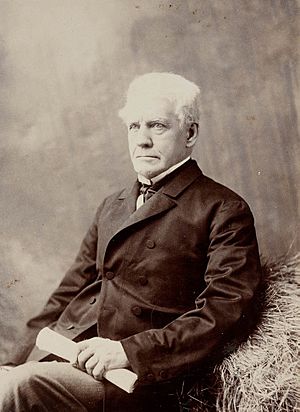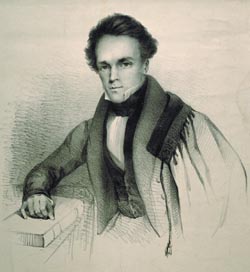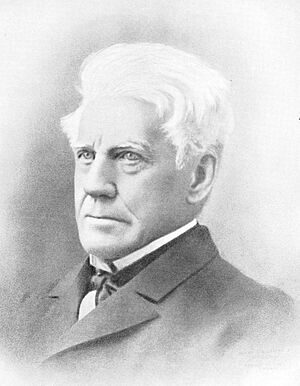George Bennett (naturalist) facts for kids
Quick facts for kids
George Bennett
|
|
|---|---|

Bennett in c. 1880
|
|
| Born | 31 January 1804 Plymouth, England
|
| Died | 29 September 1893 (aged 89) Sydney, Australia
|
| Occupation | Physician, naturalist |
| Known for | Casuarius bennettii, Dendrolagus bennettianus, Myrrophis bennetti |
George Bennett (born January 31, 1804 – died September 29, 1893) was an important English-born Australian doctor and naturalist. He won the Clarke Medal in 1890 for his amazing work.
Contents
Early Life and Education
George Bennett was born in Plymouth, England. When he was 15, he traveled to Ceylon (now Sri Lanka). After this trip, he decided to study medicine. He went to medical schools in Plymouth and London. He became a qualified doctor in 1828.
A Career Exploring Nature
After becoming a doctor, Bennett worked as a surgeon on ships. This job allowed him to travel to many places, including Sydney, New South Wales, in 1829.
Studying the Platypus
In 1832, Bennett became very interested in the Platypus. His friend, Richard Owen, was studying how platypuses feed their young. Bennett decided to help solve this mystery during his travels.
Travels and Discoveries
In May 1832, Bennett began a two-year journey. He wrote about his adventures in a book called Wanderings in New South Wales, Batavia, Pedir Coast, Singapore and China. This book was published in 1834.
He also wrote one of the first important scientific papers about the platypus. It was called "Notes on the Natural History and Habits of the Ornithorhyncus paradoxus, Blum."
Contributions to Science in Australia
Bennett returned to Australia in 1836 and became a successful doctor in Sydney. But he never stopped loving science. He helped start the Royal Entomological Society of London. He also became the honorary secretary of the Australian Museum. In 1837, he created a list of all the natural history items in the museum.
In 1860, he published another book, Gatherings of a Naturalist in Australasia. He wrote letters to famous scientists like Charles Darwin and Richard Owen. He even sent the first chambered nautilus specimens to England!
Bennett was very involved with the Sydney Botanic Gardens. He also helped the Zoological Society and the Australian Museum. He collected many interesting specimens, including a gibbon from Sumatra. He also helped a young girl from the New Hebrides (now Vanuatu) named Elau visit Europe.
Wide-Ranging Interests
Bennett wrote many articles for different scientific journals. His interests were very broad. For example, in 1871, he wrote about looking for fossils in Queensland. He also wrote about how to grow oranges and other citrus fruits.
Later Life and Legacy
In 1888, when he was 84, Bennett wrote a chapter about mammals for a book about Sydney. In 1890, the Royal Society of New South Wales gave him the Clarke Medal. This award recognized his important work on Australia's natural history. George Bennett passed away in Sydney on September 29, 1893.
Animals Named After George Bennett
Several animals are named in honor of George Bennett. These include:
- The dwarf cassowary (Casuarius bennettii)
- Bennett's tree-kangaroo (Dendrolagus bennettianus)
- Bennett's two-pored dragon (Diporiphora bennettii)
- Bennett's water snake (Myrrophis bennetti)
He also had a large collection of books about Australia, which was later bought by William Dymock.
Family Life
George Bennett was married three times and had several children.
Works Authored
- Bennett, George (1834). Wanderings in New South Wales, Batavia, Pedir Coast, Singapore and China: being the journal of a naturalist in those countries, during 1832, 1833 and 1834 (Vol. 1) London: Richard Bentley, University of Hong Kong Libraries, Digital Initiatives, China Through Western Eyes
- Bennett, George (1834). Wanderings in New South Wales, Batavia, Pedir Coast, Singapore and China: being the journal of a naturalist in those countries, during 1832, 1833 and 1834 (Vol. 2) London: Richard Bentley, University of Hong Kong Libraries, Digital Initiatives, China Through Western Eyes
 | Audre Lorde |
 | John Berry Meachum |
 | Ferdinand Lee Barnett |



